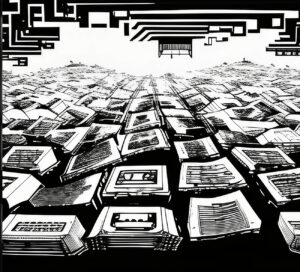Web 3.0 Interoperability, not a Choice but a Necessity.
For Web 3.0, interoperability is the key. Siloed ecosystems create considerable entry barriers, which is not ideal for a consumer product. For Web 3.0 to survive, the priority should be ease of use and accessibility. Users need to operate in ecosystems with low educational requirements, and must have implicit trust in a zero-trust architecture [ZTA].
At NEST®, we are well aware of the stigma surrounding the word Web 3.0. At this point, Web 3.0 is a word used to describe any development forward from the current state of the internet. The narrative portrayed by companies and news outlets references complete decentralization, utilization/monetization of your data and assets, ultimate transparency, etc.
Allow us to make it simple.
Web 2.0 is characterised by power in the hands of the few. Most all monetization lies in the hands of large corporations, data and information are not in users’ control, and end-consumers lack personal choice of how their digital footprint is utilized. You can participate in the digital world, but you do not have control.
Web 3.0 aims to restructure the balance of power, shifting the control as far away from the corporations and as close to the individuals as possible. Will there still be large companies and corporations operating in this space? Absolutely. But, these platforms will serve to facilitate your digital experiences rather than dictate them. As a consumer, you should and will have personal choice.
At NEST®, we believe the right to personal choice is a fundamental human right, both in the real world and in the digital world.
Currently, Web 3.0 is fractured; protocols and businesses operate independently of one another. The companies that will thrive will work to bring together the fragmented ecosystem. Competition can be helpful to drive innovation, but not at the expense of the user experience. Without collaboration, scalability will be impossible. Searching for the next new protocol, often labelled the new Ethereum killer, is not the way forward. The next step forward is unity.
A unified front is a necessity.
Interoperability is essential not only for consumers but for developers. Developers need the ability to build platforms on protocols that suit their needs and ensure their work is accessible to users on different platforms. From a developer’s point of view, communication between protocols is critical to mass adoption. Currently, their hard work is limited to the network they choose to build on; for future adoption, applications must be utilizable across the entire industry.
“Comparing these protocols once again to unique cities, they operate independently of one another, but to thrive must allow for communication, commerce, trade, and travel to and from neighbouring locations.”
On the consumer front, users need incentivization. There needs to be a reason people abandon the old for the new. In a world where every business claims to provide value to consumers, the ones that will thrive will offer the ultimate value. User control and choice. If you want to bring in consumers, incentivize them by giving them the power to decide how they engage in the emerging distributed economy. Allow consumers to manage and monetize their identity and information. Allow them to truly utilize and own their assets across different platforms. Allow them to engage in the new digital world without worrying about being exploited. This is a scary proposition for businesses, as it takes confidence in your product and business model. Our message to those businesses is, if you don’t give the users control, somebody else will. The choice is yours.
Our message to users, keep your eyes out for projects that consistently work towards providing you sovereignty, there lies the future winners.
–
Aman Deol
NES.TECH





